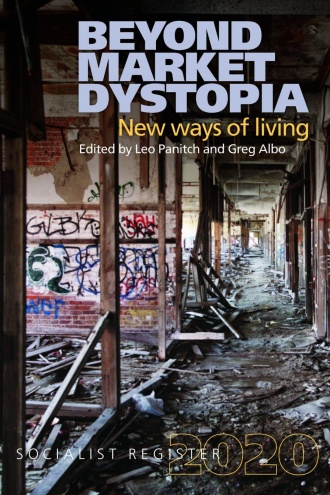This is the last article you can read this month
You can read more article this month
You can read more articles this month
Sorry your limit is up for this month
Reset on:
Please help support the Morning Star by subscribing here
WITH its focus on new ways of living, Beyond Market Dystopia posits different ways of looking beyond the gloom of neoliberalism and the growth of far-right political influences in Britain and internationally.

Yet this latest publication from Socialist Register is not about promoting a set of utopian dreams. Rather, the editors’ aim is to identify “alternative ways of living in the dystopian present” by exploring questions about social reproduction, ecology and production and advancing prefigurative ways of living and working.
While there are chapters on the world of work which take account of “digital capitalism,” precarious working and the gig economy, there are also contributions on ways of living which take account of concerns with environmental sustainability.
Also covered are alternative approaches to education, housing and planning and looking at ways of challenging the dominance of neoliberalism — how to teach children critical ways of thinking about their communities and their struggles for rights, for instance, rather than promoting neoliberal agendas which focus on how to become a successful entrepreneur.
There are examples of how to support refugees collectively in empowering ways and how to address the crisis in the availability of affordable housing in global cities.
The opening chapter, “Class politics, socialist policies, capitalist constraints,” sets the political context for what follows as it explores the strengths as well as the limitations of left programmes in Britain and the US.
It compares and contrasts the 2017 and 2019 Labour election manifestos with the plans for stakeholder capitalism put forward by Elizabeth Warren, aspiring to be selected as the Democratic candidate to challenge Donald Trump in November, along with plans for the Green New Deal.
The chapter concludes by noting the profound dilemmas any socialist-led government would face within current constraints.
But there are also possibilities for building solidarity and strategic coherence, working towards alternative policies and politics and developing the socialist forces that have become more evident within the British Labour Party and the US Democratic Party.
The final chapter returns to some of these strategic questions, reflecting on the importance of understanding the ways in which capitalism has been changing as the basis for expanding our understandings of socialism, reimagining the relations between production and reproduction, society and nature, along with the social and the political spheres.
Socialists need to turn things right-side up, Nancy Fraser argues, and they need “to install the nurturing of people, the safeguarding of nature and democratic self-rule as society’s highest priorities, which trump efficiency and growth.”
The chapter on learning from the experiences of a socialist commune and more recent progressive initiatives in Los Angeles suburbs is particularly fascinating, as is that on different ways in which the legacies of Soviet architecture and the “socialist city” have been understood.
While they might not perhaps have universal appeal, given their specificity, and some chapters will be more controversial than others, there is much of interest in this stimulating collection.
Published by Merlin, £18.99.












